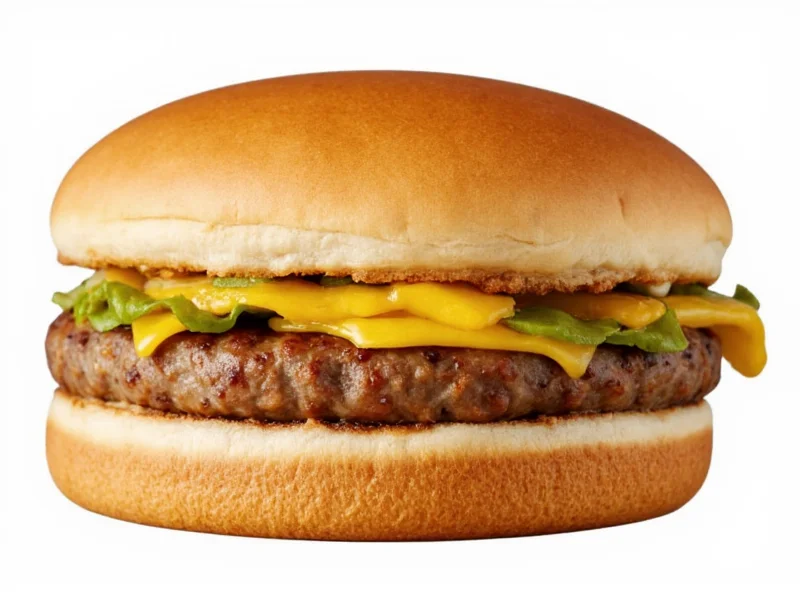Understanding the nutritional content of popular fast food items helps you make informed dietary choices. The Sausage McMuffin remains one of McDonald's most popular breakfast sandwiches, but its calorie count can vary depending on preparation and additions.
Nutritional Breakdown of a Standard Sausage McMuffin
The classic Sausage McMuffin consists of a savory pork sausage patty served on a toasted English muffin. According to McDonald's official nutrition information, this combination delivers:
| Nutrient | Amount | % Daily Value* |
|---|---|---|
| Calories | 400 | 20% |
| Total Fat | 24g | 31% |
| Saturated Fat | 9g | 45% |
| Trans Fat | 0.5g | - |
| Cholesterol | 65mg | 22% |
| Sodium | 760mg | 33% |
| Total Carbohydrates | 29g | 10% |
| Dietary Fiber | 1g | 4% |
| Sugars | 2g | - |
| Protein | 17g | - |
*Percent Daily Values are based on a 2,000 calorie diet. Your daily values may be higher or lower depending on your calorie needs.
Sausage McMuffin Variations and Their Calorie Counts
McDonald's offers several variations of this breakfast sandwich, each with different nutritional profiles:
| Sandwich Variation | Calories | Key Differences |
|---|---|---|
| Sausage McMuffin with Egg | 480 | Adds a fried egg, increasing protein and fat content |
| Sausage McMuffin with Egg and Cheese | 530 | Includes American cheese slice |
| Sausage McMuffin Light | 280 | Smaller sausage patty, reduced-fat cheese, and light English muffin |
| Sausage McMuffin Meal (with hash browns and coffee) | 700-850 | Meal total varies based on beverage size and type |
How Sausage McMuffin Calories Fit Into Daily Needs
For adults following a standard 2,000-calorie diet, the 400 calories in a Sausage McMuffin represent approximately 20% of daily energy needs. While this might seem reasonable for a single meal, consider these factors:
- The sandwich delivers 45% of your recommended daily limit for saturated fat
- Sodium content accounts for over one-third of the recommended daily maximum
- Fiber content is relatively low at just 1 gram
- Protein content (17g) provides solid nutritional value
Nutritionists often recommend that breakfast should contain 300-500 calories for most adults, making the standard Sausage McMuffin an appropriate portion size calorie-wise, though its nutritional balance could be improved.
Comparing Sausage McMuffin to Other Breakfast Options
When evaluating how many calories in a sausage mcmuffin compares to alternatives, consider these common breakfast choices:
| Breakfast Option | Calories | Protein (g) | Fiber (g) |
|---|---|---|---|
| Sausage McMuffin | 400 | 17 | 1 |
| Homemade vegetable omelet (2 eggs, veggies) | 280 | 18 | 3 |
| Greek yogurt with berries and nuts | 320 | 20 | 5 |
| Oatmeal with banana and almond butter | 350 | 10 | 8 |
| McDonald's Egg McMuffin | 310 | 18 | 1 |
Smart Ordering Tips for Health-Conscious Consumers
If you enjoy McDonald's breakfast but want to manage your calorie intake, consider these practical suggestions:
- Choose the Egg McMuffin instead of the Sausage McMuffin for 90 fewer calories and less saturated fat
- Request no cheese to reduce calories by approximately 50 and saturated fat by 3g
- Pair your sandwich with a side of fruit instead of hash browns to add fiber and nutrients
- Opt for black coffee or unsweetened tea rather than sugary beverages
- Consider the Sausage McMuffin Light if you're watching your calorie intake but still want the sausage flavor
Understanding Fast Food Nutrition Information
When researching how many calories in a sausage mcmuffin or other fast food items, always check the most current nutrition facts directly from the restaurant's official website. Nutrition information can change due to recipe modifications or regional differences. McDonald's provides detailed nutrition information for all menu items on their corporate website, which is updated regularly to reflect current formulations.
Remember that individual nutritional needs vary based on age, gender, activity level, and health goals. While the Sausage McMuffin can fit into a balanced diet when consumed occasionally, relying on fast food for regular meals may make it challenging to meet all your nutritional requirements.
How many calories are in a Sausage McMuffin with egg?
A Sausage McMuffin with egg contains 480 calories. The addition of a fried egg increases both the protein content (to 22g) and fat content compared to the standard version.
Is the Sausage McMuffin considered high in sodium?
Yes, with 760mg of sodium, the Sausage McMuffin provides 33% of the recommended daily maximum (2,300mg). This qualifies as high sodium content, especially considering it's just one component of a typical breakfast.
How does the Sausage McMuffin Light compare nutritionally to the regular version?
The Sausage McMuffin Light contains 280 calories compared to 400 in the regular version. It achieves this reduction through a smaller sausage patty, reduced-fat cheese, and a light English muffin, though it still contains 18g of protein.
Can I find the nutrition facts for McDonald's Sausage McMuffin online?
Yes, McDonald's provides complete nutrition information for all menu items on their official website. You can find detailed breakdowns of calories, fat, carbohydrates, protein, and other nutrients for the Sausage McMuffin and all its variations.
What's the healthiest breakfast option at McDonald's?
The Egg McMuffin (310 calories) is generally considered one of the healthier breakfast options at McDonald's, with lower calories and saturated fat than the Sausage McMuffin. Pairing it with fruit instead of hash browns creates a more balanced meal.











 浙公网安备
33010002000092号
浙公网安备
33010002000092号 浙B2-20120091-4
浙B2-20120091-4